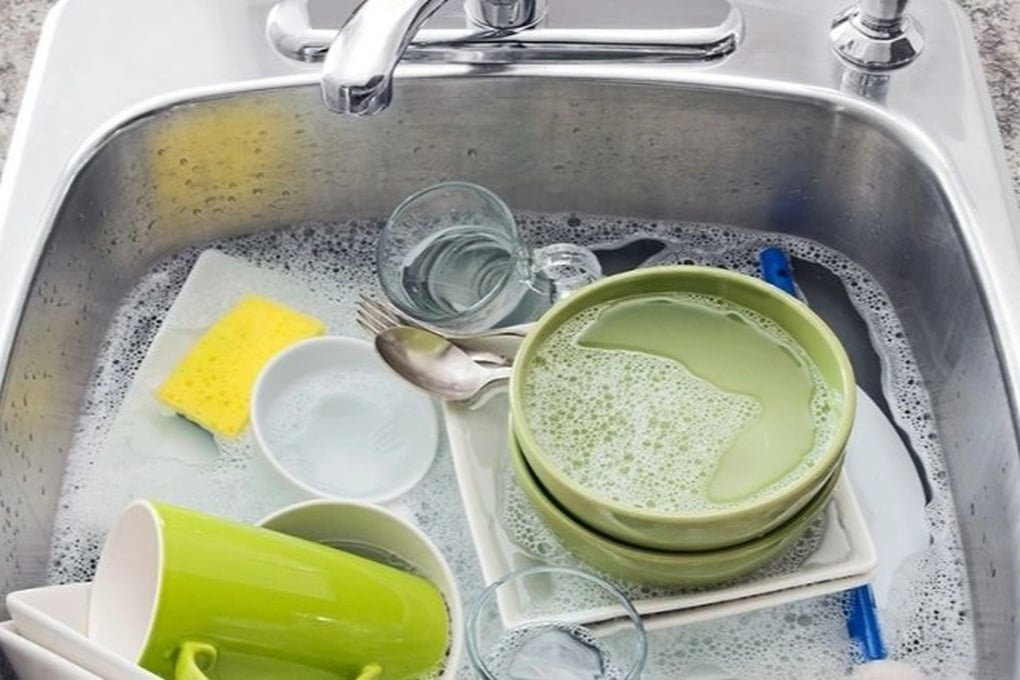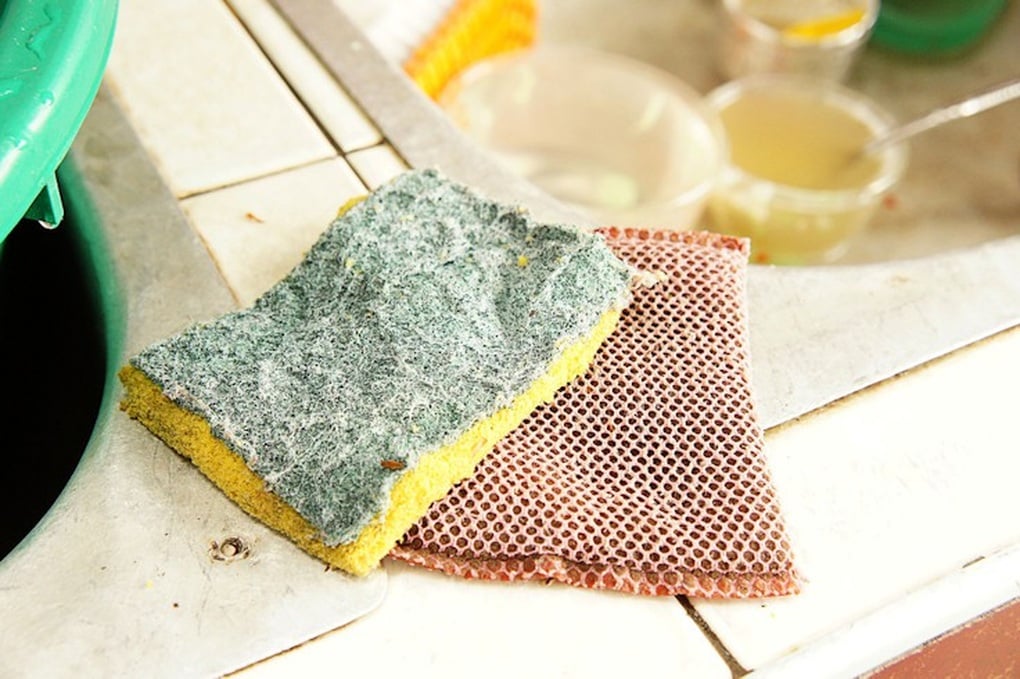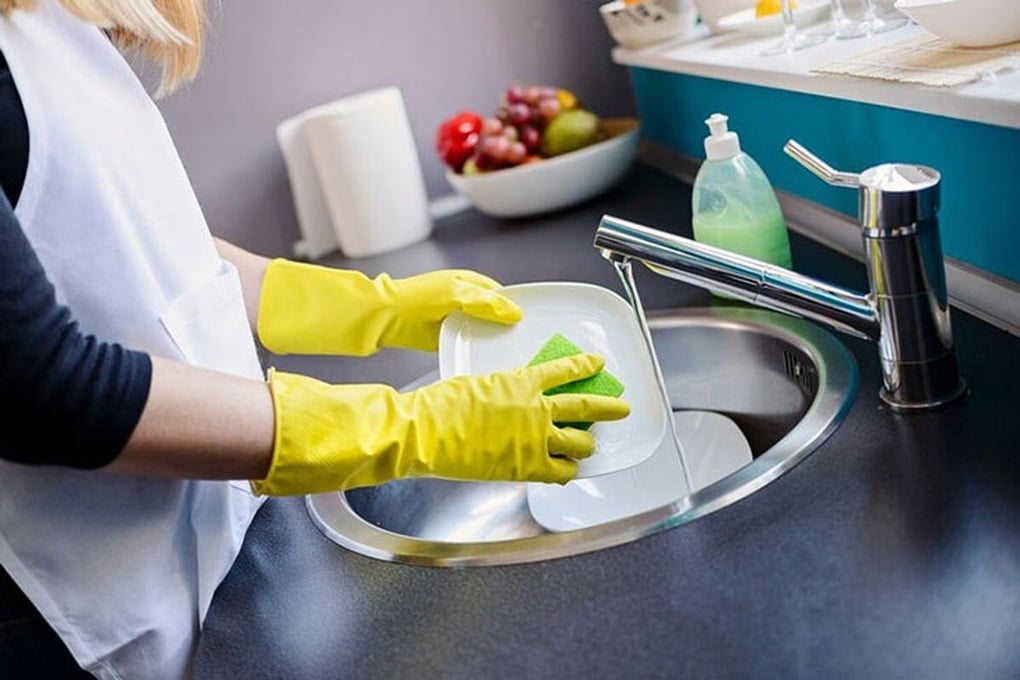(Dan Tri) - Small habits in washing dishes, if done incorrectly, can cause major consequences for family health.
Many people are subjective about small habits after meals without realizing that they can cause serious health consequences.
Not washing dishes promptly, not changing sponges, or not washing dishes properly all increase the risk of exposure to bacteria, mold, and toxic substances.
These bacteria and toxins, if accumulated in the body over time, will lead to dangerous diseases such as digestive infections, poisoning, and even cancer.
Soaking dishes in the sink for too long
Soaking dirty dishes in the sink for hours after eating is a common habit in many households.

Soaking dishes in the sink for too long increases the risk of bacterial contamination (Photo: Getty).
According to research from the University of Arizona (USA), sinks, cutting boards and sponges are items that can contain more bacteria than toilets in the bathroom. A dirty cutting board can contain 200 times more bacteria than a toilet, while the faucet of the kitchen sink also contains 44 times more bacteria.
Research also shows that bacteria like E. coli and Salmonella can grow and spread rapidly in sinks, especially when exposed to moist air.
If dirty dishes and chopsticks are soaked for 1-4 hours after eating, the number of bacteria can increase many times, reaching one billion within 10 hours. This directly affects the health of the digestive system, causing dangerous digestive diseases and can increase the risk of cancer if continued for a long time.
Not replacing the sponge regularly
Dishwashing sponges are also a potential "bacterial nest" if not cleaned and replaced regularly.

Old dishwashing sponges can be a hotbed of bacteria (Photo: Getty).
According to a study from the Fraunhofer Institute for Biological Research in Germany, each square centimeter of a dishwashing sponge can contain up to 45 billion bacteria, including common disease-causing bacteria such as E. coli and Salmonella .
An unclean sponge can accidentally cause bacteria to stick to the dishes as soon as we wash them, causing the risk of cross-contamination when using these items in the next meals.
Research also shows that damp sponges are an ideal environment for bacteria to grow, so replacing your sponge once a week is important to maintain hygiene in the kitchen.
If you use an antibacterial or hot-water washable sponge, wash it at least weekly to minimize bacteria.
Not washing dishes properly
Washing dishes properly seems simple, but not everyone understands the safety measures.

When washing dishes, there are many important things to keep in mind (Photo: Getty).
According to Brightside , when buying new dishes, you should boil them for 30 minutes to disinfect them before using. In addition, dishes that smell or are not clean can be soaked in vinegar or tea water for about 30 minutes to completely remove the bad smell.
Another important note is not to overuse detergents such as baking soda or citric acid to avoid damaging the surface and material of the dishes.
Using a dry towel to wipe dishes after washing or drying them in the sun is an effective way to prevent mold from growing and producing aflatoxin, a toxin that can cause liver cancer.
A study from the University of Tokyo (Japan) shows that if damp dishes are stacked on top of each other, mold can easily grow and produce aflatoxin. Aflatoxin is a carcinogen that has been classified by the World Health Organization (WHO) as a group I - capable of causing cancer in humans, especially liver cancer.
According to WHO, aflatoxin produced by mold can cause serious liver damage if it accumulates in the body for a long time. Therefore, after washing, you should dry the dishes with a clean towel or dry them in the sun to prevent mold growth and ensure hygiene and safety for your family.
Source: https://dantri.com.vn/suc-khoe/3-sai-lam-khi-rua-bat-khien-ca-nha-ruoc-benh-20241105064510058.htm




![[Photo] "Beauties" participate in the parade rehearsal at Bien Hoa airport](https://vstatic.vietnam.vn/vietnam/resource/IMAGE/2025/4/11/155502af3384431e918de0e2e585d13a)
![[Photo] Looking back at the impressive moments of the Vietnamese rescue team in Myanmar](https://vstatic.vietnam.vn/vietnam/resource/IMAGE/2025/4/11/5623ca902a934e19b604c718265249d0)
















![[Photo] Summary of parade practice in preparation for the April 30th celebration](https://vstatic.vietnam.vn/vietnam/resource/IMAGE/2025/4/11/78cfee0f2cc045b387ff1a4362b5950f)





























































Comment (0)